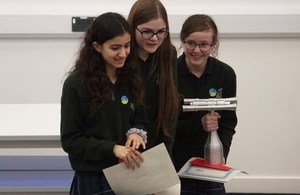Dstl backs local STEM challenge for girls
Girls in Wiltshire schools come up with innovative solutions for a sustainable world

Winners of the STEM challenge for South Wilts Grammar School for Girls
Staff from the Defence Science and Technology Laboratory supported girls in Wiltshire schools in the annual Soroptimists STEM Challenge trophy.
Dstl provided STEM Ambassadors as judges and mentors for the schools during the project, and attended the awards event with a display to discuss careers with the girls.
The teams, from Years 8 and 9, were asked to research what simple sustainable innovation could make life better for people living in poverty in the developing world. They were challenged to design and create a prototype for a sustainable innovation that could improve the lifestyle of people living in the third world.
Dstl STEM Ambassador Lisa Scandling, Chairman of the Judges and President Elect of the new Salisbury Soroptimist Club said:
I believe it is important for Dstl to support initiatives to encourage young people, particularly girls, to consider careers in STEM. Through the STEM ambassador scheme within Dstl, this challenge allowed Dstl mentors to work in schools alongside the teams supporting, guiding and encouraging them.
Their ideas, knowledge about the world and research skills are just incredible – they are so much better than I remember being at their age! If we have encouraged even a fraction of the girls there to consider the range of possible futures in STEM, then I think we have done well.
The team ‘Fresher, Faster Water Supplies’ from South Wilts Grammar School won the STEM Challenge trophy and cash prizes for themselves and their school at this year’s award ceremony. Some 21 girls across five teams from three schools entered the competition, now in its second year, to encourage local girls to consider careers in science, technology, engineering and mathematics (STEM).
The winning team focused on providing eco-friendly and sustainable water supplies to Yemen with their entry, which made use of aluminium piping and solar powered batteries to power the generator to pump the water. The girls said:
We chose Yemen because it is one of the most water-deprived countries in the world and does not have an irrigation system in place.
Judges were Cerys Rees, Fellow at Dstl, Helen Harrison, Deputy Head of Electrical Engineering and Construction at Wiltshire College and Rhian Griffith, Design Engineer at Gilo Industries.
The judges also selected a runner-up team, Starchy St Ed’s of St Edmund’s Girls School, who they felt showed a strong approach to project planning and research through several experiments. They paid tribute to all five teams for their “high level of presentation, the level of research and the dedication of time that each team had put in and the teamwork shown.”
The other schools’ finalists were:
‘Tomorrow’s Masterminds’ and ‘Dauntsey’s Team 2’ from Dauntsey’s School and ‘SITNC’ from St Edmund’s Girls School .
The third Salisbury STEM Challenge will start in September 2019, and girls in KS 3&4 in local schools have until February 2020 half term to develop their entries.